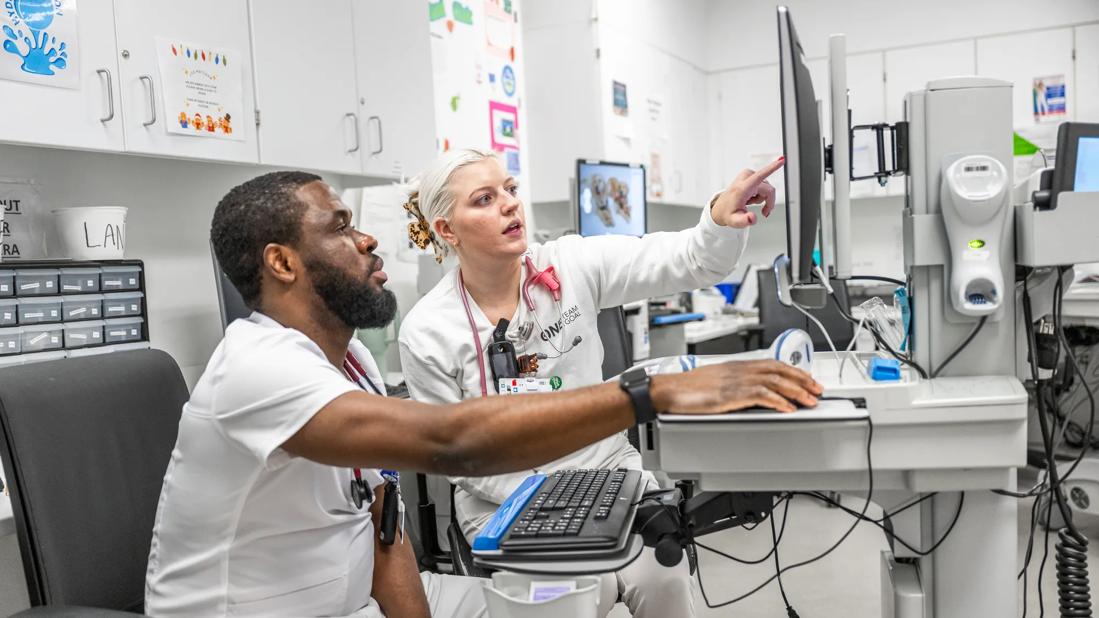Cleveland Clinic’s Information Technology Apprenticeship Program expands skill set while leading to meaningful employment

Image content: This image is available to view online.
View image online (https://assets.clevelandclinic.org/transform/c43c06a7-388d-4e59-bc96-3a17c7ceb946/CGO_4502958_12-29-23_378_MLC-jpg)
Nurses at computer
Rayven Spates always pictured a career in healthcare. Then she started her respiratory therapy training and realized hands-on clinical care wasn’t her calling.
Advertisement
Cleveland Clinic is a non-profit academic medical center. Advertising on our site helps support our mission. We do not endorse non-Cleveland Clinic products or services. Policy
“My personal aspiration was to work in a hospital,” says Spates, “It was devastating to realize that working at the bedside made me squeamish.”
That reality shifted Spates toward a different career pathway in healthcare.
As a student at Cuyahoga Community College (Tri-C), Spates heard about a unique Cleveland Clinic apprenticeship program to “earn-and-learn” while pursuing a career in information technology (IT).
Spates explains, “Being an IT apprentice was the chance to play an important role in healthcare in a different way. It’s been an absolute wonderful opportunity, and I love what I do.”
Spates, a Cleveland Clinic systems analyst associate, was part of the inaugural 12-month apprenticeship program led by Geneva Foster, a senior program manager within Cleveland Clinic’s Information Technology Division (ITD).
“Mentorship has been an essential part of my professional development,” says Foster. “With my mentor’s guidance, supporting our apprentices and helping define the program’s structure was a natural progression for me.”
The program structure evolved with input from participating IT areas, the apprentices and support from Cleveland Clinic’s Global Leadership and Learning Institute (GLLI). With Foster serving as the preceptor, the program took shape by defining the competency framework and by identifying the required credentials to segue into full-time employment.
Foster explains, “We developed a network of mentors and trainers to guide the apprentices throughout the program. This structured approach and individual attention provided hands-on experience and broadened knowledge specific to each IT area.”
Advertisement
IT managers developed training criteria, competencies and evaluation metrics relevant to their area. For credentialing, all trainees were also required to obtain Information Technology Infrastructure Library (ITIL) certification; an industry standard and ITD employment requirement.
GLLI provided additional support with monthly professional development training that honed soft skills such as being a strong contributor, time management and prioritizing projects.
“With these supplemental offerings and ongoing feedback, we were able to apply lessons learned in the moment as opposed to waiting for the next cohort. That flexibility was instrumental in tailoring a unique experience for each apprentice and helping them land their permanent position,” says Foster.
For Terrell Weeks, the IT apprenticeship program was an opportunity to expand his skill set.
“I’ve always had an interest in IT and this program extended the potential pathways to obtain a full-time position with a world class organization,” says Weeks, a Cleveland Clinic systems analyst associate. “That’s a priceless opportunity.”
Weeks continues, “By rounding with the various teams, I learned about the many facets of healthcare IT — it’s much more than coding. Plus, the teams were open to questions and supportive. These encounters were vital in helping me identify which team best fit my interests.”
Like Spates, Danielle Hunter was a student at Tri-C when she learned about the program.
“I was a student and working in an administrative position when this program piqued my interest,” says Hunter, a member of the Cleveland Clinic software development team. “After completing the program, I went from no coding experience to completing a whole project on my own.”
Advertisement
Hunter attributes her success to speaking up to find the best career fit.
“You have to be your biggest advocate and ask the hard questions to steer your career in the right direction,” says Hunter. “There are a lot of moving parts as you transition throughout the program and various areas.”
Apprentice graduate Shacour Patterson agrees, “Ask questions until you have a solid understanding of each area’s objectives and outcomes. That way, you’re better prepared in finding the best position. Nothing is guaranteed, so do the hard work to align your skills with the right position.”
Patterson, a Cleveland Clinic system analyst associate, appreciates her team’s knowledge and guidance. She credits the team with giving her extra time to gain better insight into their daily work before making her final decision to apply for their position.
Above all, Spates adds, “Come ready to learn. It’s inspiring and rewarding to find your place at Cleveland Clinic.”
Advertisement
Advertisement
Digital “tripwires” detect and respond to malicious activity, boosting cybersecurity maturity
Thoughtful collaboration, data-driven decisions and effective change management lead to significant savings
Clinical input is integral to technology implementation and adoption strategy
Unit-based project decreases non-urgent alarms
Integrating technology is more than product delivery
Cleveland Clinic partners with Palantir to create logistical command center
Cleveland Clinic’s roadmap to recovering critical digital assets stems from strategic planning and preparedness
The Friends of Cybersecurity program bridges innovative technology solutions with mitigating security risks